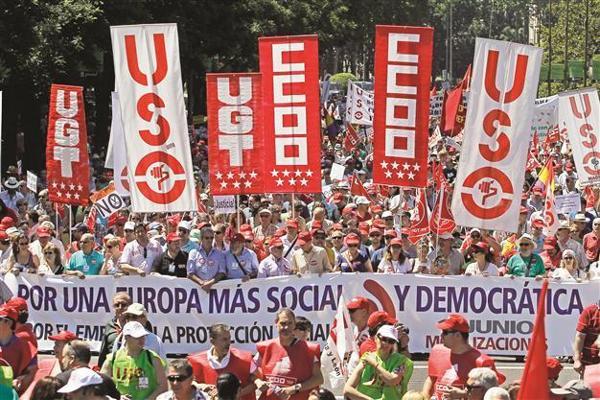European leaders to meet as concerns over future grows
BRUSSELS - Agence France-Presse


Protesters march holding a banner reading ‘For a more social and democratic Europe. More jobs and social protection’ during a demonstration in Madrid. AP photo
EU leaders meet this week knowing they have to deliver growth and jobs, especially for the young, as years of debt crisis austerity and soaring dole queues test faith in the European project.The debt crisis may have eased, allowing governments some leeway on austerity in favour of growth, but the question is how far they can go without compromising hard won gains.
Germany, the bloc’s biggest economy and paymaster, insists that strained public finances still have to be put right first if the EU is to get back on track, while France under Socialist President François Hollande says growth is the priority.
The summit on tomorrow and the next day comes against a distinctly mixed backdrop -- the European economic outlook is for further recession and the global picture is uncertain as China slows sharply.
At the same time, borrowing costs kept low by central bank intervention are beginning to rise and are expected to go much higher, clouding the outlook for both business and states whose debt burden will now only weigh heavier.
A plan to produce jobs must be approved “otherwise Europe will be seen by everyone as useless, negative and bureaucratic,” Italian Prime Minister Enrico Letta said on June 23.
“Employment for young people in Europe has collapsed,” Letta told RAI public television.
In April, the last month for which figures are available, unemployment in the 17-nation eurozone hit a 24th consecutive monthly high at 12.2 percent or 19.3 million people, while the 27-member EU had an 11-percent jobless rate or more than 26 million out of work.
In the 16-25 age bracket, the situation was much worse -- the eurozone had an average unemployment rate of 24.4 percent or 3.6 million, and the EU 23.5 percent or 5.6 million.
Even worse, however, was the situation in bailed-out Greece, with a youth jobless rate of more than 60 percent, followed by Spain on 50 percent and Italy and Portugal at 40 percent -- levels so high that people are talking of a “lost generation” which may never find work.
EU President Herman Van Rompuy describes the problem as “one of the most pressing issues in most, if not all, of our member states” which leaders simply must tackle if the union is to prove its worth.
“We want to avoid another summit with a lot of declarations and little action,” a diplomat in Brussels told AFP.
Growing frustration with the EU’s role is clearly evident. At the weekend, the pro-EU Dutch government said the time of “an ever closer union” in Europe was over, setting out a raft of policy areas that should be left to member states rather than Brussels.
“This is an issue which strikes a chord with many people across Europe,” it said, adding that its aim was to create “a European Union that is a more modest, more sober and at the same time more effective.” Conservative British Prime Minister David Cameron has called for powers to be taken back from Brussels and for Britain’s refashioned membership to be put to an ‘in-out’ referendum.
Banking union meeting today
Another key issue for growth and credibility are stalled efforts to put in place a “banking union,” the new regulatory system meant to prevent failing lenders from damaging the wider economy, as they have done repeatedly during the debt crisis.
Lengthy talks last week produced no accord on how a failed bank should be wound up, mainly due to differences over who should foot the bill. EU finance ministers will meet again today, right ahead of the summit.
“An agreement on banking union is fundamental for us,” Letta said. “We will not accept any compromise on this because banking union means protecting savers from possible crashes ... making the European financial system more solid and getting loans at lower rates,” he said.
